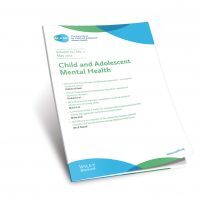Blog
-

Short Research Article: RESEED – the perceived impact of an enhanced usual care model of a novel, teacher-led, task-shifting initiative for child mental health
Paper from the CAMH journal – ‘We explore the perceived impact of RESEED (Responding to Students’ Emotions through Education), an abbreviated version of Tealeaf (Teachers Leading the Frontlines). After classroom implementation of tools from a 3-day training on child mental health and cognitive behavioral techniques in Darjeeling, India, 29 teachers participated in focus group discussions (FGDs).’ Setareh Ekhteraei (pic) et al.
Read more -

Sexual orientation and mental health in a US cohort of children: a longitudinal mediation study
Paper from the JCPP – ‘We examined longitudinal associations between sexual orientation and mental health over 2 years in a US cohort of children (aged 9–10 at baseline) and two explanatory factors (increased social problems such as getting teased and decreased perceived school safety)’. Brian A. Feinstein (pic) et al.
Read more -

Academic motivation decreases across adolescence for youth with and without ADHD (Attention-Deficit/Hyperactivity Disorder): Effects of motivation on academic success
Video abstract from Dr. Zoe Smith on her JCPP paper ‘Academic motivation decreases across adolescence for youth with and without attention-deficit/hyperactivity disorder: Effects of motivation on academic success’.
Read more -

Depressive symptoms and loneliness among early adolescents: a psychometric network analysis approach
Open Access paper from the JCPP – ‘This study investigates: (a) the symptoms of depression that are connected to loneliness; (b) the role played by loneliness in the network of depression symptoms; and (c) whether the method used to measure loneliness (single-item direct or multi-item indirect) affects the relationship of loneliness with depressive symptoms’. Paweł Grygiel (pic) et al.
Read more -

Mind the Missing NSE Gap: The Influence of Non-shared Environment on Symptoms of Behaviour Problems
In this Papers Podcast, Aga Gidziela discusses her JCPP paper ‘Explaining the influence of non-shared environment (NSE) on symptoms of behaviour problems from preschool to adulthood: mind the missing NSE gap’.
Read more -

Early childhood general anesthesia and risk of Attention Deficit Hyperactivity Disorder
Paper from the JCPP – ‘This population-based cohort study aimed to investigate the potential relationship between general anesthesia (GA) exposure and ADHD risk using propensity score matching (PSM) in a large sample size’. Mingyang Sun et al.
Read more -

Three year outcomes in infants with a family history of autism and/or attention deficit hyperactivity disorder
Open Access paper from JCPP Advances – ‘Most research on early outcomes in infants with a family history (FH) of autism has focussed on categorically defined autism, although some have language and developmental delays. Less is known about outcomes in infants with a FH of attention deficit hyperactivity disorder (ADHD)’. Tony Charman (pic) et al.
Read more -

Therapeutic alliance in the treatment of adolescent substance misuse: a systematic review
Open Access paper from the CAMH journal – ‘Therapeutic alliance has been found to play an influential role in predicting outcomes for adults and adolescents in psychotherapy. However, thus far, the information concerning the impact of therapeutic alliance on outcomes for adolescents in treatment for substance misuse has not yet been critically synthesised’. Iniyah Sulaman et al.
Read more -

Engaging Young People in Conversations Exploring the Impact of Their Online Use on Mental Health
Young people have better access to the internet than ever before, with those under 18 accounting for one in three internet users globally. Recently, The Royal College of the Psychiatrists in the UK advised that social media and online use should be considered in assessing risk of all young people they meet. However, it is currently unclear whether this advice has been implemented in practice.
Read more -

Changes in UK Parental Mental Health Symptoms Over the COVID-19 Pandemic
In this Papers Podcast, Dr. Simona Skripkauskaite discusses her JCPP Advances paper ‘Changes in UK parental mental health symptoms over 10 months of the COVID-19 pandemic’.
Read more